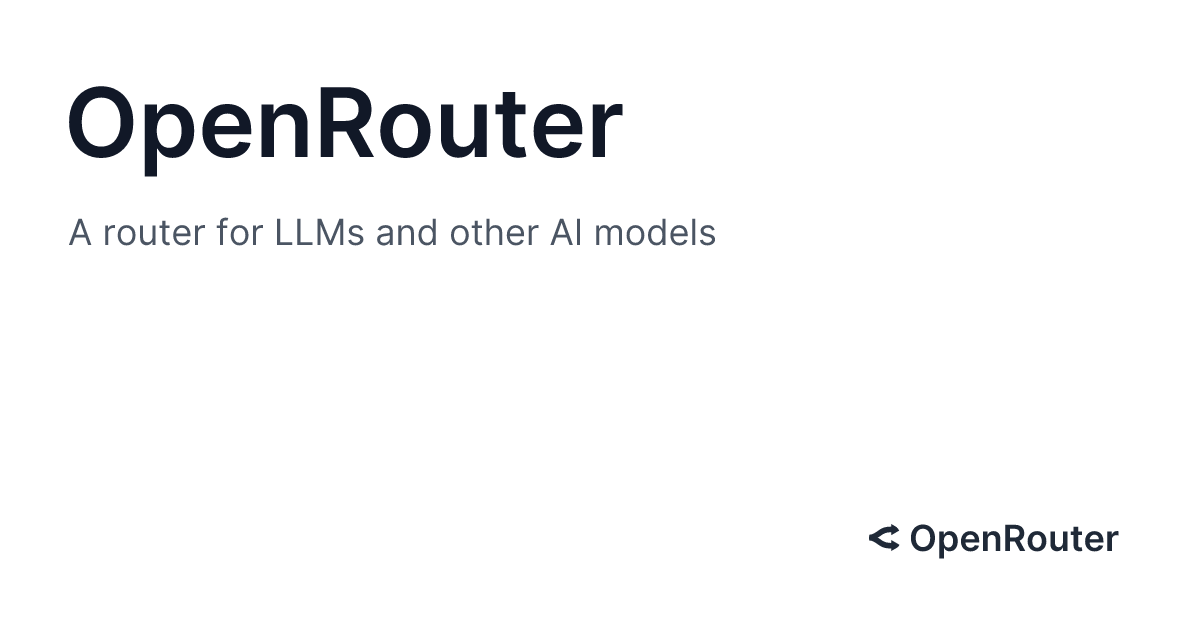OpenRouter is a platform designed to simplify the process of accessing and utilizing Large Language Models (LLMs) and other AI models. It acts as a router, allowing developers to connect to various models through a single API endpoint, streamlining integration and providing flexibility in model selection. OpenRouter aims to optimize performance, cost, and reliability by intelligently routing requests to the most suitable model based on user-defined criteria.
OpenRouter Key Features
Model Routing
OpenRouter intelligently routes API requests to different LLMs based on factors like cost, performance, and availability. This ensures optimal performance and cost-efficiency for each request. Users can specify preferences or constraints to influence the routing decisions.
Centralized API Endpoint
Access multiple LLMs through a single, unified API endpoint. This simplifies integration and reduces the complexity of managing multiple API keys and configurations.
Performance Monitoring
Track the performance of different models and routing configurations using built-in monitoring tools. Gain insights into latency, cost, and accuracy to optimize your LLM usage.
Data Policy Management
Visualize and manage data policies for different models. Understand how your data is being used and ensure compliance with privacy regulations.
Dynamic Pricing
Benefit from dynamic pricing that adjusts based on model availability and demand. This helps to minimize costs and maximize resource utilization.
Wide Range of Model Support
OpenRouter supports a diverse range of LLMs, including models from DeepSeek, Qwen, MistralAI, Cohere, and more. This allows users to choose the best model for their specific needs.
How OpenRouter Works
OpenRouter functions by acting as an intermediary between the user's application and various LLM providers. When a request is sent to the OpenRouter API endpoint, the platform analyzes the request and routes it to the most appropriate model based on pre-configured routing rules and real-time performance data. The response from the chosen model is then returned to the user's application.
OpenRouter Benefits
Cost Efficiency
Optimize LLM costs by routing requests to the most cost-effective models.
Performance Optimization
Improve the performance of your LLM applications by dynamically selecting the best-performing models.
Simplified Integration
Reduce the complexity of integrating multiple LLMs with a single API endpoint.
Increased Reliability
Ensure high availability by automatically routing requests to alternative models in case of outages.
Enhanced Data Privacy
Gain better control over your data by managing data policies for different models.
OpenRouter Use Cases
Chatbots
Route chatbot conversations to the most appropriate LLM based on the user's query and the context of the conversation.
Content Generation
Select the best model for generating different types of content, such as articles, blog posts, and social media updates.
Code Completion
Route code completion requests to models that are specifically trained for code generation.
Data Analysis
Utilize different LLMs for analyzing and extracting insights from data.
OpenRouter FAQs
What models are supported by OpenRouter?
OpenRouter supports a wide range of LLMs, including models from DeepSeek, Qwen, MistralAI, Cohere, and more. See the website for a complete list.
How does OpenRouter ensure data privacy?
OpenRouter allows users to manage data policies for different models, ensuring compliance with privacy regulations.
How does the dynamic pricing work?
Dynamic pricing adjusts based on model availability and demand, helping to minimize costs.
Who Should Use OpenRouter
OpenRouter is ideal for developers and data scientists who want to simplify the process of accessing and utilizing LLMs. It is particularly useful for those who want to optimize performance, cost, and reliability by intelligently routing requests to the most suitable model. Perfect for both startups and enterprises looking to leverage the power of LLMs without the complexity of managing multiple API integrations.
